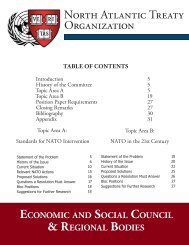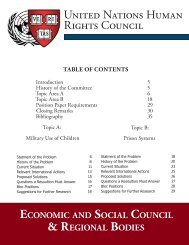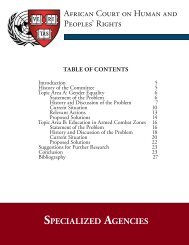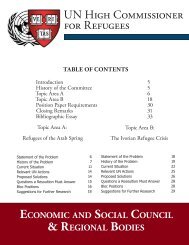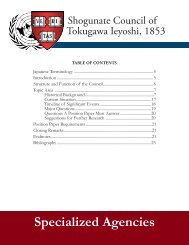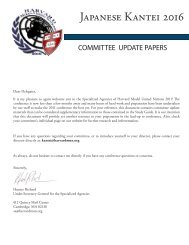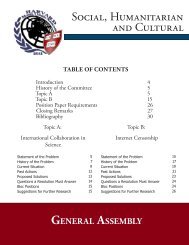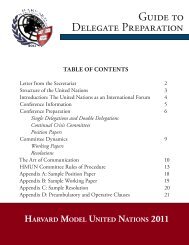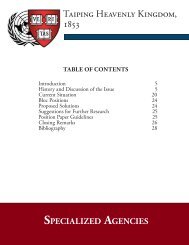World Trade Organization - Harvard Model United Nations
World Trade Organization - Harvard Model United Nations
World Trade Organization - Harvard Model United Nations
You also want an ePaper? Increase the reach of your titles
YUMPU automatically turns print PDFs into web optimized ePapers that Google loves.
<strong>World</strong> <strong>Trade</strong> <strong>Organization</strong><br />
Developing Countries<br />
Developing countries often oppose developed<br />
countries in trade and environment negotiations as many<br />
are experiencing tremendous economic growth, often at<br />
the expense of the environment. They are concerned<br />
of unilateral use of trade measures for environmental<br />
purposes (as the US often did in the 1980s and the<br />
1990s). During the Doha Rounds, they were resistant<br />
to the discussion of environmental negotiations in<br />
the WTO and eventually reluctantly accepted the<br />
WTO environmental agenda. Due to their inability to<br />
prevent the discussion totally, they have been pushing<br />
for narrower interpretations of the Doha environmental<br />
mandate. 86<br />
European Community<br />
The European community has been an innovator in<br />
reconciling conflicts between trade and environmental<br />
policy. Ever since the 1987 Single European Act, the<br />
European Community has worked to adapt regulations<br />
to meet environmental goals as well as to eliminate<br />
the remaining barriers to trade within the European<br />
Community. The Act stated that the European Union<br />
has power to make environmental laws when it would<br />
be more effective than any individual country action<br />
in meeting environmental goals. This theme of unity<br />
extends to product regulations and standards as well. The<br />
EU has been working to harmonize technical regulations<br />
to production processes because differences in production<br />
processes could result in technical barriers to trade. 87<br />
Suggestions for Future Research<br />
The sources I found most helpful were the <strong>United</strong><br />
<strong>Nations</strong> Environment Program’s “Environment and<br />
<strong>Trade</strong>: A Handbook,” documents on the OECD website,<br />
as well as law review articles that explained the legal<br />
nuances of the environment and trade debate. The<br />
sources definitely had some technical and legal jargon but<br />
they did do a great job of looking at the problem from<br />
all angles. These are just suggestions. Feel free to explore<br />
topics mentioned in more detail if you are interested and<br />
to explore other topics mentioned only in briefing. Don’t<br />
hesitate to reach out to me if necessary!<br />
POSITION PAPERS<br />
Position papers are a crucial part of a <strong>Model</strong> <strong>United</strong><br />
<strong>Nations</strong> committee, as they serve two very important<br />
purposes. Firstly, writing the position paper is very<br />
helpful for you as it will promote your understanding of<br />
the main policies of the country that you are representing,<br />
including where your country stands on the issue, what<br />
actions it has taken in the past, and what it hopes to<br />
achieve in the conference. Secondly, the position papers<br />
that are written by each delegation can prove to be very<br />
useful for other delegates as well; they enable delegates<br />
to find out more about the specific details of different<br />
countries’ policies regarding the topic of discussion,<br />
and will thus promote better debate in committee. You<br />
should take care in writing these position papers, making<br />
sure that they are clear and concise, and that they include<br />
the necessary information stipulated below.<br />
Position papers should include a header with your full<br />
name, the topic area of the position paper, the country<br />
that you are representing, and the high school you are<br />
from. They should be single-spaced, in Times New<br />
Roman size 12 font, and should be organized into three<br />
main parts. The first part should include a statement<br />
of the problem and what your country sees as the most<br />
important aspects of the topic. You should demonstrate<br />
how the problem relates specifically to your country and<br />
why it is something that you are hoping to talk about.<br />
The second part should describe your country’s policies<br />
on the issue and what action it has taken in the past, and<br />
the third section should delineate potential solutions<br />
to the problem that your country would support. In<br />
certain cases, it’s possible that you may not be able to<br />
find specific information regarding what future solutions<br />
your country will support. If that is the case, the best<br />
approach would be to research the broader policies of<br />
your country and try to think of solutions of your own<br />
that you think are relevant.<br />
CLOSING REMARKS<br />
<strong>Model</strong> <strong>United</strong> <strong>Nations</strong> was developed to provide<br />
young individuals with knowledge about international<br />
relations and global issues, while at the same time offering<br />
experience with diplomacy. The <strong>Harvard</strong> <strong>Model</strong> <strong>United</strong><br />
<strong>Nations</strong> conference targets a large group of high school<br />
students and successfully accomplishes these goals with<br />
a high level of organization, a devoted dais staff, and an<br />
outstanding secretariat. Most importantly however, the<br />
success of HMUN depends highly on you, the delegates.<br />
Your passion and interest about the topics that<br />
are discussed in committee are what stimulate the<br />
dynamic debate, promote the instructive atmosphere,<br />
and produce the thoughtful resolutions that will come<br />
out of this experience. The dedication and knowledge<br />
that you bring to the conference and the time that you<br />
22<br />
Specialized General Assembly Agencies




